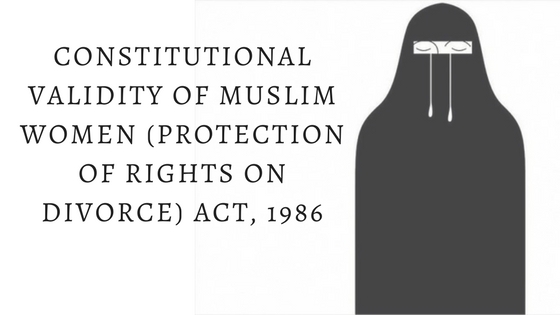Aapka Consultant Judgment Series- In this series, we are providing case analysis of Landmark Judgments of Hon’ble Supreme Court of India.
Danial Latifi and anr. Vs. Union of India
AIR2001SC3958, (2001)7SCC740
Hon’ble Judges/Coram: S. Rajendra Babu, G.B. Patnaik, , D.P. Mohapatra, Doraiswamy Raju and Shivaraj V. Patil, JJ.
Decided On: September 28th, 2001
FACTS:
Post Shah Bano Case, Parliament enacted Muslim Women (Protection of Rights on Divorce) Act, 1986. Section 3 and Section 4 provides for the maintenance of the Muslim Wife. These sections are, in particular, under challenge in the present case as contention lead by the opposite side that this Act was enacted to make the ruling of the Shah Bano case ineffective.
ISSUE:
Whether the Muslim Women (Protection of Rights on Divorce) Act, 1986 is constitutionally valid?
JUDGMENT:
The Court observed that the Muslim Women Act was enacted with the intention of making the judgment in the Shah Bano case ineffective. Heavy reference was made to the Shah Bano case throughout the judgment, in which it was held that if the divorced wife is able to maintain herself, the husband’s liability ceases with the expiration of the period of iddat, but if she is unable to maintain herself after the period of iddat, she is entitled to recourse to Section 125 Cr.P.C.
Sections 3 and 4 of the Act were the principles sections under attack. Section 3 provides that divorced woman is entitled to obtain from her former husband ‘maintenance’, ‘provision’, and ‘mahr’, and to recover from his possession her wedding presents and dowry and authorizes the Magistrate to order payment or restoration of these sums or properties. Section 4 empowers the magistrate to issue an order for payment of maintenance to the divorced woman against several of her relatives. A reading of the Act will indicate that it codifies and regulates the obligations due to a Muslim woman divorcee by putting them outside the scope of Section 125 Cr.P.C. The maintenance under the Act is to be paid by the husband for the duration of iddat period and this obligation does not extend beyond the period of iddat. The Court observed that the purpose of the Act appeared to be to allow the Muslim husband to retain his freedom of avoiding payment of maintenance to his erstwhile wife after divorce and the period of iddat.
At the time of divorce the Muslim husband is required to contemplate the future needs and make preparatory arrangements in advance for meeting those needs. The Court held that nowhere in the Act the Parliament has provided that reasonable and fair provision and maintenance is limited only for the iddat period and not beyond it. It would extend to the whole life of the divorced wife unless she gets remarried. The wording of Section 3 indicates that the husband has two separate and distinct obligations. First is to make reasonable and fair provisions for his divorced wife. Second is to provide maintenance for her. The Court held that the emphasis of the Section is on the time by which an arrangement for payment of provision and maintenance should be concluded, namely, ‘within the iddat period’. The Court held that as per the language employed in Section 3(1)(a), it is clear that a fair and reasonable provision is to be made while maintenance is to be paid. Also, Section 4 of the Act provides only for maintenance and not provision. The right to have ‘a fair and reasonable provision’ in her favour is a right enforceable only against the woman’s former husband, and in addition to what he is obliged to pay as maintenance. The Court observed that ‘a reasonable and fair provision’ under Section 3(3) of the Act would be with reference to the needs of the divorced woman, the means of the husband, and the standard of life the woman enjoyed during the marriage and there is no reason why such provision could not take the he form of the regular payment of alimony to the divorced woman.
The Court held that the provisions of Section 125 Cr.P.C. would still be attracted and even otherwise, the Magistrate has been conferred with the power to make appropriate provisions for maintenance and what could earlier be granted under Section 125 Cr.P.C. would now be granted under the very Act itself. Hence, the Act cannot be held to be unconstitutional. The Act actually and in reality codifies what was stated in Shah Bano’s case. The Court also held that when by appropriate reading of an enactment the validity of an Act can be upheld, such interpretation is accepted by the courts and not the other way. Also, preponderance of judicial opinion was in favour of the Court’s interpretation of the Act.
HELD:
The Muslim Women (Protection of Rights on Divorce) Act, 1986 was held to be constitutionally valid and this Act in reality codifies what was stated in Shah Bano Case.
To Get Legal Opinion from Advocates/ Legal Experts, Please click here
To Get Legal Opinion from Retired Hon’ble Judges, Please click here












